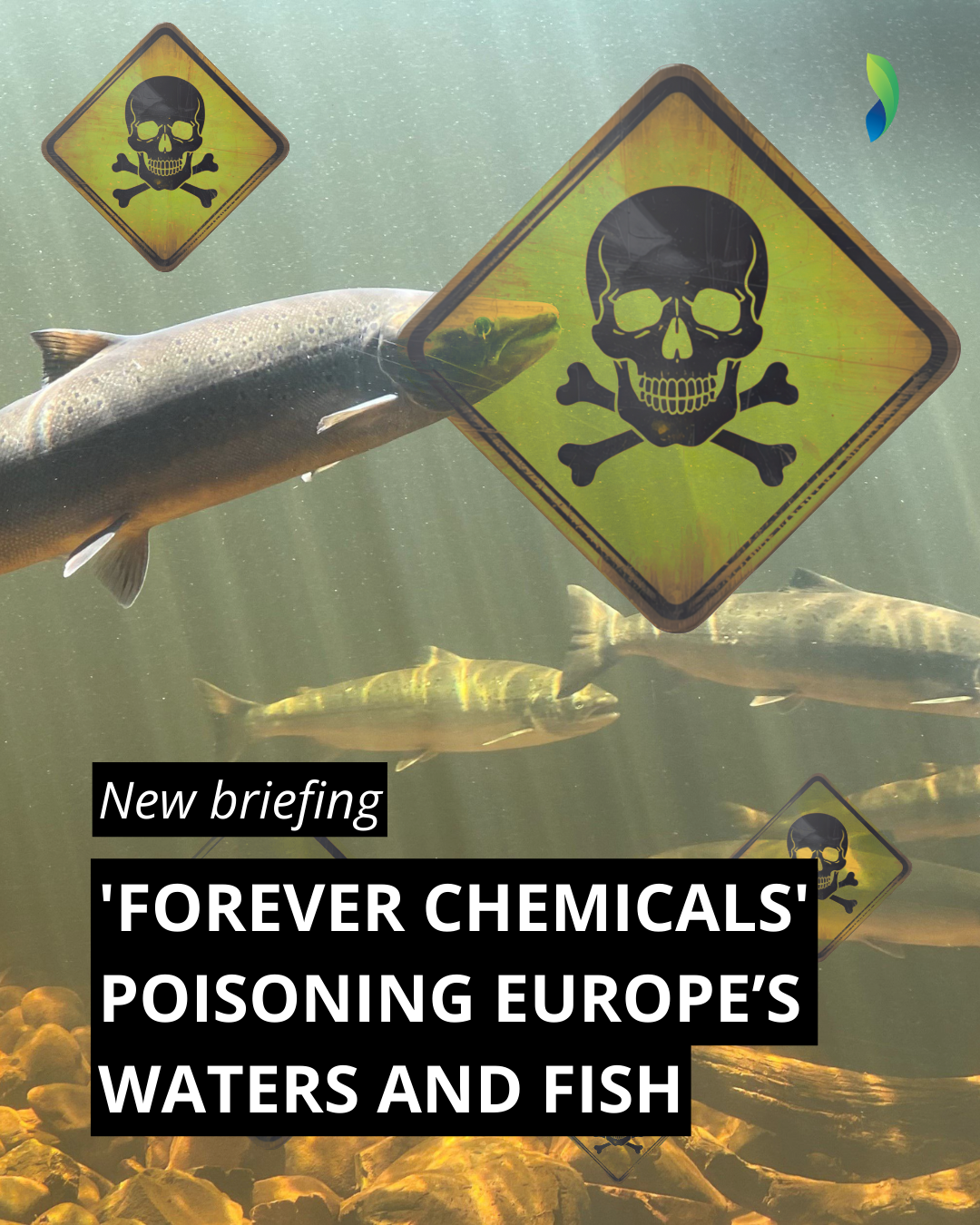Damning new report: EU fish polluted with ‘forever chemicals’, while governments seek to delay action
A new report from the European Environmental Bureau (EEB) and its member organisations reveals widespread PFAS contamination in wild fish across Europe, with many samples far exceeding proposed new safety limits. These so-called "forever chemicals" pose a growing threat to public health and aquatic ecosystems - yet EU Member States are pushing to delay action on needed pollution controls until 2039.

The EEB briefing, “Forever chemicals poisoning Europe’s waters and fish: The tip of the PFAS iceberg,” analyses monitoring data from Austria, France, Germany, Italy, Poland, Spain, and Sweden. It shows that most fish samples tested between 2009 and 2023 contained dangerous levels of PFOS, a persistent PFAS identified as possibly carcinogenic for humans.
Key findings:
- Nearly all reported values exceed proposed new EU safety limits;
- 24% of values in Sweden, 19% in France, and 15-17% in Austria and Spain exceed the limit by 500 times or more;
- Some samples from Sweden, Germany and Spain exceeded the proposed standard by over 10,000 times.
This analysis only covers one PFAS chemical – PFOS – while new EU proposals would target a group of 24, suggesting the scale of contamination is likely far greater.
Outdated EU rules are masking the true extent of the crisis.
Member States are currently only required to monitor PFOS, and not the thousands of other harmful PFAS chemicals. A 2022 proposal from the EU Commission to update EU water pollution laws, including regulating a group of PFAS in coastal and freshwater, including biota, has faced several delays, with governments now seeking to push compliance until 2039 – potentially wasting more than a decade of action in the urgent fight against toxic pollution.
The EEB is calling for immediate EU-level action to protect nature and public health from pollution. The next key moment: EU institutions meet on 23 September to decide the future of Europe’s water pollution standards.
Sara Johansson and Athénaïs Georges, EEB said:
"PFAS pollution of EU waters and its wildlife is widespread, yet badly underreported. Coherent obligations on Member States to act to limit further water pollution, e.g. by putting in place stricter discharge permits for industry are urgently needed. We urge the EU institutions to stop delaying action and to adopt updated EU water pollution standards, with a binding obligation for Member States to include measures to limit further pollution from PFAS and other priority pollutants in the next River Basin Management Plans."
CCB contributed to the work of the EEB briefing with the analysis of the Polish data made by Ewa Leś, CCB Eutrophication Working Area Leader, founder of River University, and expert in freshwater security governance, who commented:
"Across Europe, PFOS contamination in rivers, lakes and coastal waters is alarmingly high, with fish in some countries showing levels more than 19,000 times above the new safety standards. While Sweden has taken early, preventive steps, most countries still lag behind in monitoring and transparency. In Poland, structured data from the Chief Inspectorate for Environmental Protection is an important step forward – but citizens still lack full access to information on contaminated sites. Data precision protects public health, and we call on state institutions to strengthen monitoring and reporting."
***
Notes to editors
- Currently, fewer than 30% of EU surface waters achieve good chemical status, but this figure is based on a narrow and outdated list of 45 pollutants dating from 2013, including only one PFAS.
- EU Member States are not on track to deliver on their obligation to bring Europe’s waters to good status by 2027 at the latest, andthe European Commission recommends Member States to implement additional measures to address chemical pollution.
- A wide range ofstakeholders have called on the EU institutions to ensure that Member States are obliged include measure to limit further water pollution of PFAS and other harmful chemicals in the next River Basin Management Plans that are currently being prepared.
- Over 450 scientists have called on the EU institutions to reject proposals that undermine the Water Framework Directive and its environmental objectives, and instead urgently adopt up-to-date rules, reflecting the state of the current scientific knowledge to address chemical water pollution.
For further information, contact:
Ben Snelso, Communications Officer for Agriculture and Food, European Environmental Bureau
benedict.snelson@eeb.org

